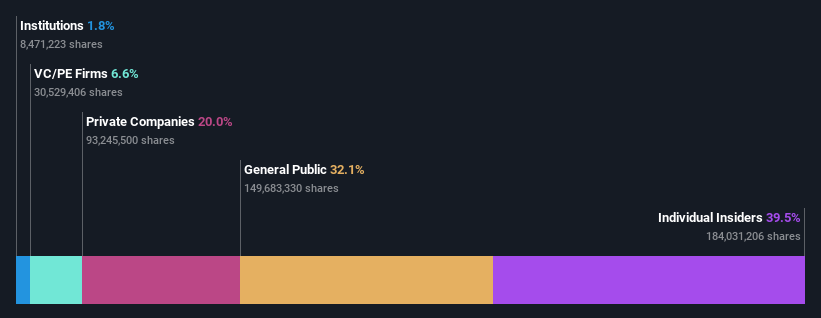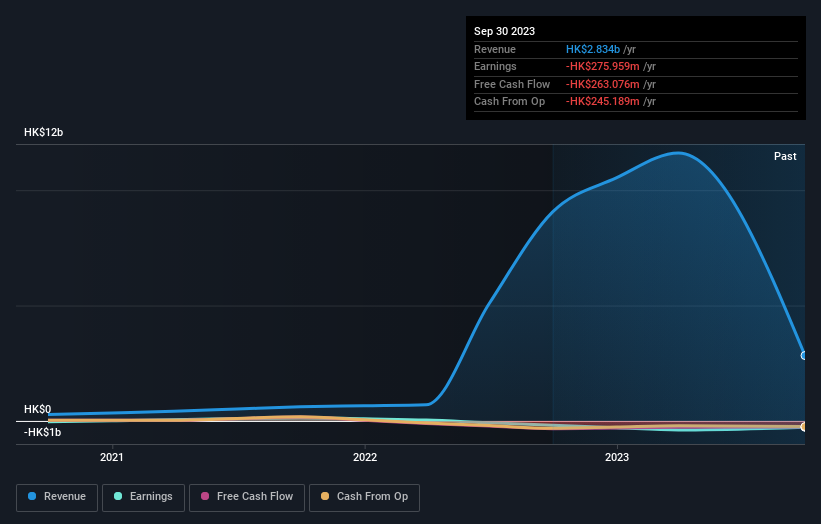Stock Analysis
- Hong Kong
- /
- Electronic Equipment and Components
- /
- SEHK:1611
Sinohope Technology Holdings Limited (HKG:1611) insiders, who hold 39% of the firm would be disappointed by the recent pullback

Key Insights
- Significant insider control over Sinohope Technology Holdings implies vested interests in company growth
- 55% of the business is held by the top 3 shareholders
- Ownership research, combined with past performance data can help provide a good understanding of opportunities in a stock
Every investor in Sinohope Technology Holdings Limited (HKG:1611) should be aware of the most powerful shareholder groups. We can see that individual insiders own the lion's share in the company with 39% ownership. Put another way, the group faces the maximum upside potential (or downside risk).
And last week, insiders endured the biggest losses as the stock fell by 17%.
Let's take a closer look to see what the different types of shareholders can tell us about Sinohope Technology Holdings.
Check out our latest analysis for Sinohope Technology Holdings

What Does The Institutional Ownership Tell Us About Sinohope Technology Holdings?
Many institutions measure their performance against an index that approximates the local market. So they usually pay more attention to companies that are included in major indices.
Institutions have a very small stake in Sinohope Technology Holdings. That indicates that the company is on the radar of some funds, but it isn't particularly popular with professional investors at the moment. So if the company itself can improve over time, we may well see more institutional buyers in the future. When multiple institutional investors want to buy shares, we often see a rising share price. The past revenue trajectory (shown below) can be an indication of future growth, but there are no guarantees.

Hedge funds don't have many shares in Sinohope Technology Holdings. Lin Li is currently the largest shareholder, with 20% of shares outstanding. For context, the second largest shareholder holds about 18% of the shares outstanding, followed by an ownership of 17% by the third-largest shareholder. Jun Du, who is the third-largest shareholder, also happens to hold the title of Member of the Board of Directors.
After doing some more digging, we found that the top 3 shareholders collectively control more than half of the company's shares, implying that they have considerable power to influence the company's decisions.
Researching institutional ownership is a good way to gauge and filter a stock's expected performance. The same can be achieved by studying analyst sentiments. We're not picking up on any analyst coverage of the stock at the moment, so the company is unlikely to be widely held.
Insider Ownership Of Sinohope Technology Holdings
While the precise definition of an insider can be subjective, almost everyone considers board members to be insiders. The company management answer to the board and the latter should represent the interests of shareholders. Notably, sometimes top-level managers are on the board themselves.
Most consider insider ownership a positive because it can indicate the board is well aligned with other shareholders. However, on some occasions too much power is concentrated within this group.
It seems insiders own a significant proportion of Sinohope Technology Holdings Limited. It has a market capitalization of just HK$1.4b, and insiders have HK$539m worth of shares in their own names. We would say this shows alignment with shareholders, but it is worth noting that the company is still quite small; some insiders may have founded the business. You can click here to see if those insiders have been buying or selling.
General Public Ownership
The general public-- including retail investors -- own 32% stake in the company, and hence can't easily be ignored. While this size of ownership may not be enough to sway a policy decision in their favour, they can still make a collective impact on company policies.
Private Equity Ownership
Private equity firms hold a 6.6% stake in Sinohope Technology Holdings. This suggests they can be influential in key policy decisions. Some might like this, because private equity are sometimes activists who hold management accountable. But other times, private equity is selling out, having taking the company public.
Private Company Ownership
It seems that Private Companies own 20%, of the Sinohope Technology Holdings stock. It's hard to draw any conclusions from this fact alone, so its worth looking into who owns those private companies. Sometimes insiders or other related parties have an interest in shares in a public company through a separate private company.
Next Steps:
I find it very interesting to look at who exactly owns a company. But to truly gain insight, we need to consider other information, too. Consider for instance, the ever-present spectre of investment risk. We've identified 4 warning signs with Sinohope Technology Holdings (at least 3 which are concerning) , and understanding them should be part of your investment process.
Of course this may not be the best stock to buy. Therefore, you may wish to see our free collection of interesting prospects boasting favorable financials.
NB: Figures in this article are calculated using data from the last twelve months, which refer to the 12-month period ending on the last date of the month the financial statement is dated. This may not be consistent with full year annual report figures.
Valuation is complex, but we're helping make it simple.
Find out whether Sinohope Technology Holdings is potentially over or undervalued by checking out our comprehensive analysis, which includes fair value estimates, risks and warnings, dividends, insider transactions and financial health.
View the Free AnalysisHave feedback on this article? Concerned about the content? Get in touch with us directly. Alternatively, email editorial-team (at) simplywallst.com.
This article by Simply Wall St is general in nature. We provide commentary based on historical data and analyst forecasts only using an unbiased methodology and our articles are not intended to be financial advice. It does not constitute a recommendation to buy or sell any stock, and does not take account of your objectives, or your financial situation. We aim to bring you long-term focused analysis driven by fundamental data. Note that our analysis may not factor in the latest price-sensitive company announcements or qualitative material. Simply Wall St has no position in any stocks mentioned.

Simply Wall St
About SEHK:1611
Sinohope Technology Holdings
Sinohope Technology Holdings Limited, an investment holding company, engages in the provision of technology solution services in The People’s Republic of China and internationally.
Mediocre balance sheet with weak fundamentals.
